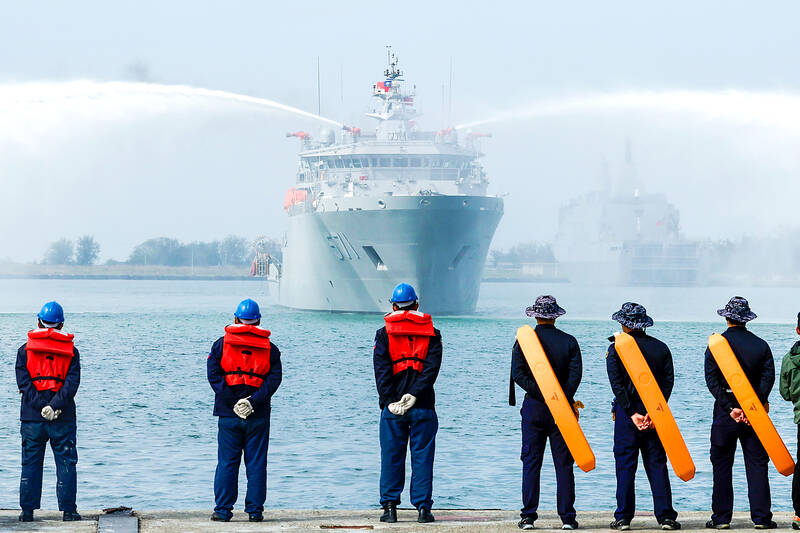The Ministry of National Defense yesterday declined to say whether Taiwan is pursuing a multibillion-dollar weapons purchase from the US, after sources briefed on the matter said that officials are in talks with Washington to procure at least US$7 billion of arms.
Three sources familiar with the situation, speaking on condition of anonymity given the sensitivity of the situation, told Reuters that Taiwan is in talks with Washington.
The package is meant to demonstrate to the US that Taiwan is committed to its defense, one of the sources said.

Photo: Ritchie B. Tongo, EPA-EFE
A second source said the package would include coastal defense cruise missiles and High Mobility Artillery Rocket Systems.
“I would be very surprised if it was less than US$8 billion. Somewhere between US$7 billion and US$10 billion,” the source added.
The White House did not immediately respond to a request for comment.
However, US National Security Adviser Mike Waltz has said he wants to speed up delivery of weapons to Taiwan.
The ministry declined to comment on specific purchases, but said it is focused on building its defenses.
“Any weaponry and equipment that can achieve those goals for building the military are listed as targets for tender,” said Major General Weng Yu-heng (翁予恒) from the Department of Strategic Planning.
The ministry would plan a special budget based on the threats posed by enemies, how urgently certain types of weapons are needed, production capacity and estimated delivery schedules, Weng added.
However, a third source said that Taiwan plans to propose a special defense budget that prioritizes precision ammunition, air defense upgrades, command and control systems, equipment for reserve forces and anti-drone technology.
Another ministry source told the Chinese-language Liberty Times (the Taipei Times’ sister paper) that the military is assessing measures to bolster the nation’s resilience, including projects related to armed forces reserves, asymmetric capabilities, precision-guided munition stockpiles, and intelligence surveillance and reconnaissance capabilities in the air and sea.
Following a national security meeting on Friday last week, President William Lai (賴清德) said that he would prioritize efforts to plan a special budget to raise Taiwan’s national defense budget to 3 percent of GDP to bolster its self-defense capabilities.
During his first term from 2017 to 2021, US President Donald Trump made regular arms sales to Taiwan, including multibillion dollar deals for F-16 jets.
The administration of former US president Joe Biden continued those sales, although often with smaller price tags.
Taiwan does not believe Trump is looking to make a “grand bargain” with Chinese President Xi Jinping (習近平) to sell out Taiwan’s interests, one of the sources said.
Trump is more concerned with putting tariffs on semiconductors, the source said.
In another sign of US commitment to Taiwan, American Institute in Taiwan Director Raymond Greene is to retain his post, three sources told Reuters, even as other US diplomatic postings undergo major reshuffles.
Additional reporting by Su Yung-yao and CNA

DAREDEVIL: Honnold said it had always been a dream of his to climb Taipei 101, while a Netflix producer said the skyscraper was ‘a real icon of this country’ US climber Alex Honnold yesterday took on Taiwan’s tallest building, becoming the first person to scale Taipei 101 without a rope, harness or safety net. Hundreds of spectators gathered at the base of the 101-story skyscraper to watch Honnold, 40, embark on his daredevil feat, which was also broadcast live on Netflix. Dressed in a red T-shirt and yellow custom-made climbing shoes, Honnold swiftly moved up the southeast face of the glass and steel building. At one point, he stepped onto a platform midway up to wave down at fans and onlookers who were taking photos. People watching from inside

A Vietnamese migrant worker yesterday won NT$12 million (US$379,627) on a Lunar New Year scratch card in Kaohsiung as part of Taiwan Lottery Co’s (台灣彩券) “NT$12 Million Grand Fortune” (1200萬大吉利) game. The man was the first top-prize winner of the new game launched on Jan. 6 to mark the Lunar New Year. Three Vietnamese migrant workers visited a Taiwan Lottery shop on Xinyue Street in Kaohsiung’s Gangshan District (崗山), a store representative said. The player bought multiple tickets and, after winning nothing, held the final lottery ticket in one hand and rubbed the store’s statue of the Maitreya Buddha’s belly with the other,

‘NATO-PLUS’: ‘Our strategic partners in the Indo-Pacific are facing increasing aggression by the Chinese Communist Party,’ US Representative Rob Wittman said The US House of Representatives on Monday released its version of the Consolidated Appropriations Act, which includes US$1.15 billion to support security cooperation with Taiwan. The omnibus act, covering US$1.2 trillion of spending, allocates US$1 billion for the Taiwan Security Cooperation Initiative, as well as US$150 million for the replacement of defense articles and reimbursement of defense services provided to Taiwan. The fund allocations were based on the US National Defense Authorization Act for fiscal 2026 that was passed by the US Congress last month and authorized up to US$1 billion to the US Defense Security Cooperation Agency in support of the

‘COMMITTED TO DETERRENCE’: Washington would stand by its allies, but it can only help as much as countries help themselves, Raymond Greene said The US is committed to deterrence in the first island chain, but it should not bear the burden alone, as “freedom is not free,” American Institute in Taiwan Director Raymond Greene said in a speech at the Institute for National Defense and Security Research’s “Strengthening Resilience: Defense as the Engine of Development” seminar in Taipei yesterday. In the speech, titled “Investing Together and a Secure and Prosperous Future,” Greene highlighted the contributions of US President Donald Trump’s administration to Taiwan’s defense efforts, including the establishment of supply chains for drones and autonomous systems, offers of security assistance and the expansion of